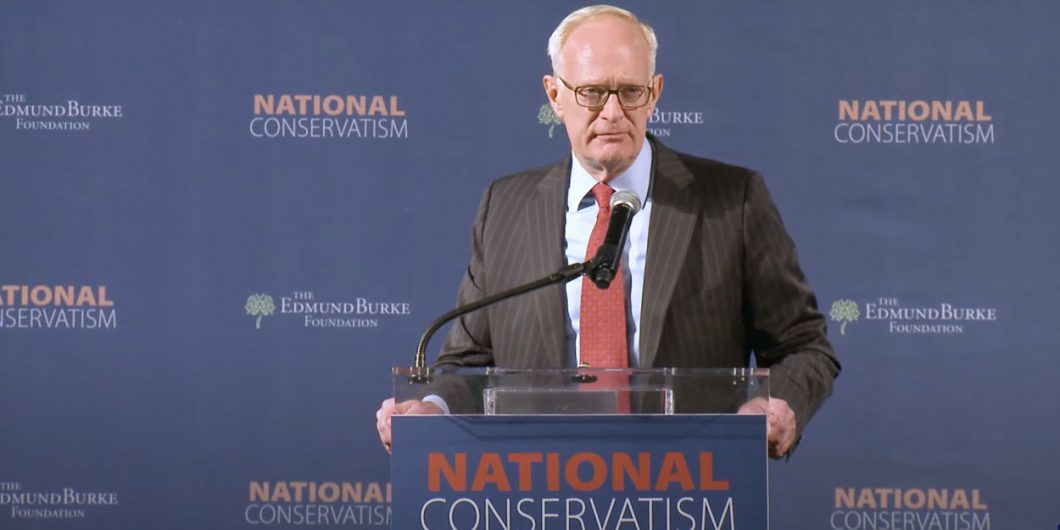The Nation is the Heart of the Matter
Editor’s Note: This article is based on Mr. DeMuth’s opening address at the European National Conservatism Conference in Brussels, Belgium, on March 23, 2022.
February 2020 turned out to be the last month to date of normal life in most of the world. Early in the month, a few cases of what came to be known as Covid-19 were identified in Rome, in individuals recently arrived from Wuhan, China. Soon Italian hospitals were overwhelmed and the government locked down the entire nation. Cases began popping up in other well-traveled parts of Europe and the United States, and local, state, and national authorities—with little understanding of the spread or seriousness of the disease, but terrified by the news from Italy—began locking down their populations. The global pandemic was upon us.
Two years later, in February 2022, the worst of the pandemic was receding; its wounds and disruptions were being repaired and life was springing up again. Then Russia invaded Ukraine and commenced killing its people, destroying its cities, and threatening the world with nuclear war. A natural disaster was replaced by a man-made disaster of horrifying savagery and stupidity.
The free nations of the prosperous West that have been under sustained assault constitute a great and admirable civilization. Vladimir Putin and the dictators of China and Iran are right to fear not only the allure of freedom but also its power. One of the first lessons of the Ukraine onslaught is that authoritarians are as bad at military organization as they are at economic and political organization. Our far-flung interconnectedness made the novel coronavirus an instant global killer—but was also key to the rapid invention of equally novel, miraculous vaccines that have saved millions of lives.
The Free World has also, however, fallen prey to certain soft conceits, which Putin and his ilk are right to see as weaknesses. We had imagined that the world’s troubles were amenable to rational management and apolitical expertise. We could leave them to specialized agencies somewhere up there in the cloud, or maybe in Brussels, if only politicians would “follow the science” and accede to the arc of global progressivism. That would free modern man to cultivate his individuality—his personal pleasures and grievances, his likes and dislikes. The fantasy that hard problems can be wished out of our lives has been an important source of decay in our culture, political rhetoric, and institutions of government.
But the last two years have been disenthralling. Experts claimed they could specify the path of global temperatures for a century hence within a few degrees—and it turned out they could miss the path of global disease for one month hence by an order of magnitude. Experts claimed that nation-states and borders were barbaric vestiges and that global bureaucracies could usher in peace and harmony—and it turned out we had barbarians at the gates in the here and now and that nations with borders were essential to peace and harmony. Experts claimed that global markets would bring prosperity and democracy—and it turned out they could also bring domestic division and imperial domination.
Into the breach came, willy nilly, the nation-state. It is unnecessary to argue that the United Nations and the World Health Organization proved useless in the crises at hand, for everyone could see that they mainly got in the way, or yakety-yacked while others took urgent action.
Managing a pandemic—a quintessential global emergency—fell inescapably to individual nations, with their diverse demographics, healthcare and hospital systems, public attitudes, structures of government, and leaders accountable to actual electorates and fellow citizens. When the European Union asserted authority over vaccine procurement and distribution, it badly mishandled them—even the New York Times called it a “fiasco.” Nations that didn’t have EU insider privileges had to come up with workarounds. When the going gets tough, democracy loses patience with technocracy.
Russia’s latest war has been analyzed in terms of spheres of influence, the return of great-power competition, dictatorship versus democracy. But the heart of the matter is the integrity of the nation. An imperial power invaded a peaceful self-governing nation for conquest, aiming to seize its territory and farms and industry, to subjugate its people, and to extinguish its traditions and institutions. That is why Ukraine has become a popular cause around the world. The Ukrainians cry out, this is our land, our home, our country. President Zelensky compares his countrymen’s struggle and heroism to the historic struggles and heroes of other nations; he is even gauche enough to name names at a time when other nations are toppling their heroes. You don’t have to have taken a course in political science to understand this war. Nor to be overwhelmed by the bravery and determination of the Ukrainians and to reflect on your responsibilities for your own national home.
And the response has been a rallying of sovereign nations that few living people have seen before. In the order of nation-states, each nation defends the overall order as its own interests require or permit. Some nations have been constrained by their existential reliance on Russian energy; others have judged that they may play a useful role as diplomatic intermediaries; plus, we are going to need a delegation to inform Putin that he has lost. Close to the fray, fears that one’s own nation may be next on Putin’s hit-list, or that in desperation he may introduce nuclear or chemical weapons into the military theater, have produced a spectrum of reactions both among and within nations. But the total response has been the provision of stupendous defensive armaments and intelligence, logistical, and humanitarian support, and repudiation of Putin and isolation of the Russian economy. Most striking of all have been the many reversals of national defense, energy, and financial policies that would have been inconceivable the day before the invasion.
All of this has been spontaneous collaboration, each nation bringing its unique assets to the cause without the benefit of direction by any supernational body. The EU has been helpful as a convening body, but it has disgraced itself by imposing heavy financial penalties on Hungary and Poland, for patently partisan and ideological reasons, just as those nations were struggling to welcome and care for hundreds of thousands of Ukrainian refugees. No self-respecting nation would have behaved in this manner in a time of war. Let us hope that Ukraine’s victory and EU membership will bring Brussels to a new policy of liberality towards the nations of Central Europe.
It is surely a positive development that, from terrible events, we are directing our hopes and expectations at the performance of the nation-state constrained by a renewed sense of realism.
The newly engaged nation-states came to the crises of the past two years woefully unready, following a long period of desuetude, self-indulgent politics, and, for many, mediocre leadership. Sovereignty needs to be earned continuously—through prudent finance and low public debt, diversification in energy and other requisites of national independence, and ample provision to prepare for natural disasters and military defense. Lacking these fundamentals, we have faced many tragic choices that were more painful and costly than they needed to have been. Having witnessed a display of national self-determination that will ring through history, we may be inspired to greater political seriousness in our own nations.
In the pandemic response, the diversity of national approaches, and within the United States the diversity of state approaches, yielded continuous policy competition and learning-by-doing. Among the free Western nations, the sharing of real-time data on infections, hospitalizations, and morbidity and mortality, and the rigorous criticisms of independent physicians and immunologists, contributed powerfully to policy realism. The climate-change mantra of “the science is settled” never got traction in a genuine crisis.
We are now coming to understand, better late than never, that comprehensive lockdowns and school closures were largely ineffective in controlling Covid-19 but fabulously costly to our economies and social well-being. We have gained this understanding precisely because of the knowledge generated by nation-led responses, which would have been obscured by uniform responses directed by the WHO, EU, or the federal government in the United States. For now, government restrictions are being lifted much faster than skeptics were predicting just a month ago. We will come to the next pandemic less confused and perhaps better equipped.
In the Ukraine response, it is disheartening that the German government has stuck with its plans to decommission perfectly good nuclear power plants, and that the U.S. government is still zealous to obstruct the development and use of fossil fuels. Nor has the war inspired Americans to set aside our bad habits of performative politics, personal positioning, and incessant scoring of ideological debating points. But the most striking development in the United States is that Congress has seized the initiative from the foreign policy elites, repeatedly forcing the Biden administration to revise and strengthen its assistance to Ukraine. Congress’s more representative, populist response has displayed Americans’ instinctive support for the underdog, but also a keen appreciation of the constraints and complications that attend American action.
The situation is highly dynamic, with many national elections in store and adjustments underway in party positions and electoral strategies. Among intellectuals, the new thinking and Left-Right-Radical alignments that began with Donald Trump and Brexit in 2016 are shifting dramatically. Where government is concerned, a good rule of thumb is to Expect the Worst and Hope for the Sufficient. But it is surely a positive development that, from terrible events, we are directing our hopes and expectations at the performance of the nation-state constrained by a renewed sense of realism.


